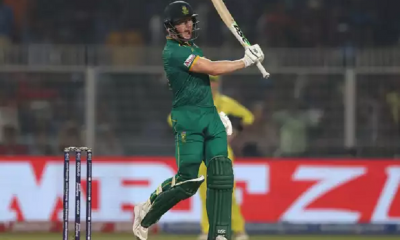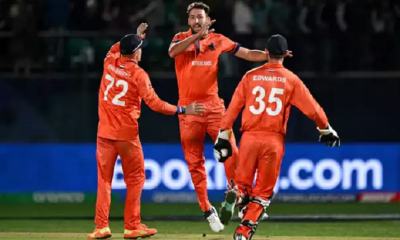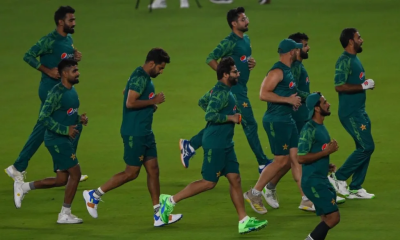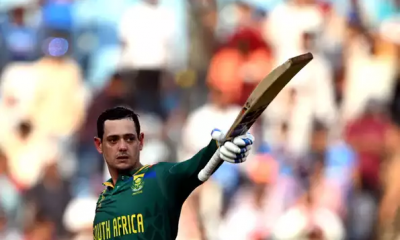Latest News
Top-order batters, five-star Santner make it two in two for New Zealand
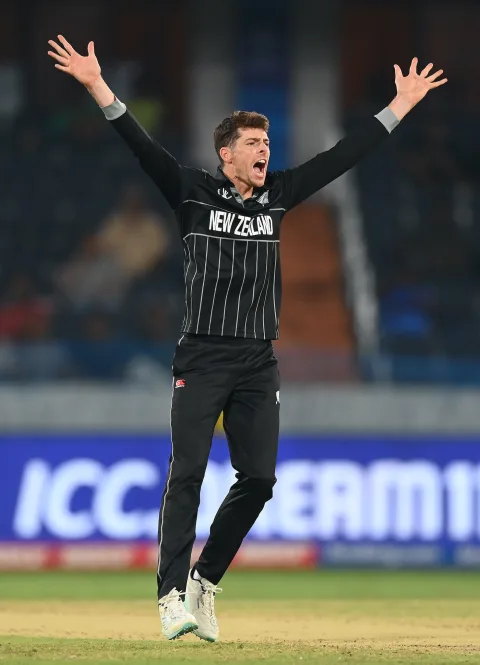
New Zealand’s innings started with three maidens in a row but ended with them bashing 50 off the last three overs, courtesy Tom Latham, Mitchell Santner and Matt Henry, which propelled them to 322. Netherlands started the chase slowly and never shifted gears as they folded for 223, as New Zealand further consolidated their position at the top of the points table after making it two in two.
Player-of-the-Match Santner, who clubbed an unbeaten 36 from 17 balls with the bat, then grabbed 5 for 59 with the ball, and in the process became the first New Zealand spinner to claim a five-for in a men’s ODI World Cup. He varied his pace consistently on a spin-friendly pitch – exactly the trait which makes him threatening – as the highlight of all his wickets was that of Scott Edwards’.
Santner slowed it down considerably and went with a wide line outside off to tempt Edwards off the fifth ball of the 35th over. The Netherlands captain had cracked 12 off the three previous deliveries – it included a six and a four – and with the required rate mounting, went slogging across the line, only for the ball to balloon back towards Santner. Thus, at 174 for 6, all of Netherlands’ little-remaining hopes of causing an upset vanished.
However, they had New Zealand in a tricky position with the ball at one stage. New Zealand lost 3 for 16 in the death overs – 238 for 3 in the 41st became 254 for 6 in the 45th – but Latham kept defying the Netherlands bowlers at one end. From being 1 off 5 balls after 34 overs, he smashed 53 from 46 despite the slow and gripping nature of the pitch, which proved challenging for all incoming batters barring Latham.
Brief scores:
New Zealand 322 for 7 in 50 overs (Will Young 70, Tom Latham 53, Devon Conway 32, Rachin Ravindra 51, Daryl Mitchell 48, Mitchell Santner 36; Aryan Dutt 2-62, Paul van Meekeren 2-59, Roelof van der Merwe 2-56) beat Netherlands 223 in 46.3 overs (Colin Ackermann 69, Teja Nidamanuru 21, Sybrand Engelbrecht 29, Scott Edwards 30; Mitchell Santner 5-59, Matt Henry 3-40) by 99 runs
(Cricinfo)
Foreign News
Scores of whales to be euthanised after mass stranding in Australia
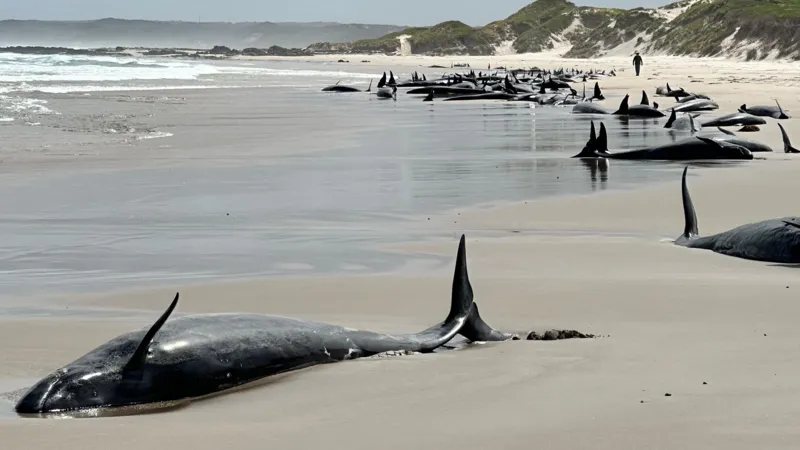
Australian authorities are euthanising about 90 false killer whales which survived a mass stranding on a remote beach in Tasmania.
A team of experts at the site said complex conditions have made it impossible to save them.
They are part of a pod of 157 whales that had beached near Arthur River, in the island’s north west. The rest had died shortly after the stranding.
Tasmania has seen a series of mass whale strandings in recent years – including the country’s worst-ever in 2020 – but false killer whales haven’t mass stranded there in over 50 years.
False killer whales are technically one of world’s largest dolphin species, like their orca namesakes. They can grow up to 6m (19ft) and weigh 1.5 tonnes.
Authorities on Wednesday said the pod had been stranded at the site for 24 to 48 hours, and the surviving animals were already under extreme stress.
Local resident Jocelyn Flint told the Australian Broadcasting Corporation she had travelled to the site on Wednesday morning after her son noticed the pod while out shark fishing overnight.
“There are babies… There’s just families of them. Their eyes are open, they’re looking at me, like ‘help’.”
“It’s just absolutely horrific.”
The site – about 300km (186 miles) from the city of Launceston – is extremely difficult to access and transport any rescue equipment to, marine biologist Kris Carlyon told media.
“This is possibly the trickiest location I’ve seen in 16 years of doing this role in Tasmania,” he said.
“We’re talking a very rough, steep, single lane road into the site. We can get four-wheel drives in there, but not a lot else.”
Rough conditions meant returning the animals to the sea at the location they stranded was impossible, so an expert team tried to relocate two and refloat them, but were unsuccessful.
“The animals just can’t get past the break to get out. They just keep turning around and coming back towards the beach,” said Shelley Graham, from Tasmania’s Parks and Wildlife Service.
With conditions for the next two days forecast to be similar, expert wildlife veterinarians made the “tough” and “confronting” decision to euthanise the remaining whales.
“The longer these animals are out stranded, the longer they are suffering. All alternative options have been unsuccessful, euthanasia is always a last resort,” Dr Carlyon said.
That grim task – which involves shooting the animals – is expected to begin on Wednesday but continue on Thursday.
Authorities are still working out how to dispose of the carcasses. The site has important cultural heritage for Aboriginal people so a department spokesperson earlier suggested “it may be a case of… letting nature run its course”.
Authorities have asked members of the public to avoid the site, with bushfires burning nearby and limited road access.
More than 80% of Australian whale strandings take place in Tasmania – often on its west coast.
Around 40 pilot whales were stranded further south at Macquarie Harbour in 2020 and about 350 of them died despite rescue efforts. Another 200 became standed in the same harbour in 2022.
Whales are highly social mammals and are well known for stranding in groups because they travel in large, close-knit communities which rely on constant communication.
There are a range of theories for why beachings occur. Some experts say the animals can become disoriented after following fish they hunt to the shore.
Others believe that one individual can mistakenly lead whole groups to shore.
[BBC]
Latest News
Gill and Theekshana are the new No. 1s in ODI rankings
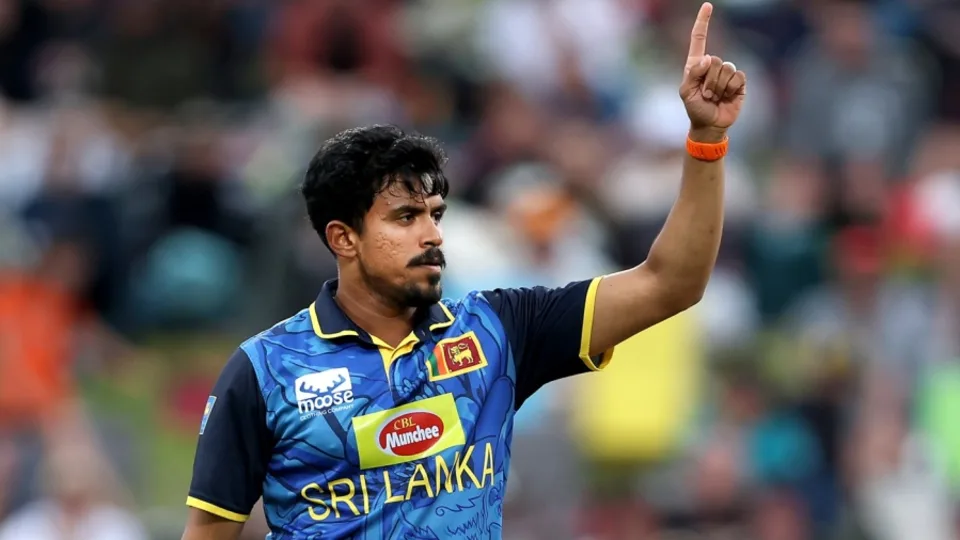
Shubman Gill and Maheesh Theekshana have become the new No. 1 men’s ODI batter and bowler respectively in the ICC rankings update released on the opening day of the Champions Trophy. Gill has gone past Babar Azam on his list, while Theekshana has gone past Rashid Khan on his.
Gill had an excellent time of it in the home ODI series against England, which India won 3-0, with scores of 87, 60 and 112, which made him the top run-getter in the series, his 259 runs coming at an average of 86.33 and a strike rate of 103.60. The next highest scorer, Shreyas Iyer, was 78 behind Gill with 181 runs.
This is the second time Gill has gone to the top of the pile in ODI cricket – the previous occasion was during the ODI World Cup in 2023.
Gill’s rise has pushed Babar to second place. Gill has 796 rating points, while Babar has 773.
They are followed in the top five by Rohit Sharma, Heinrich Klaasen and Daryl Mitchell, who has moved up two places after the tri-series in Pakistan where he scored 81, 10 and 57.
Following the two-ODI series against England, Sri Lanka captain Charith Asalanka has moved up eight spots to No. 8, while Mohammad Rizwan, the Pakistan captain, has reached 15th place.
Sri Lanka are not a part of the Champions Trophy, having missed out on qualification, but along with Asalanka, Theekshana made the most of the two-ODI series at home against Australia, returning 4 for 40 and none for 11.
Rashid, who hasn’t played an ODI since last December, has slipped to the second spot, but isn’t too far behind Theekshana – he has 669 ratings points to the table-topper’s 680, and a good Champions Trophy campaign can take him back to the top.
Behind Theekshana and Rashid on the bowlers’ table is Namibia’s Bernard Scholtz followed by India’s Kuldeep Yadav and Pakistan’s Shaheen Shah Afridi in the top five. Mitchell Santner the New Zealand captain, has made big moves too, his five wickets in the three ODIs in the Pakistan tri-series giving him a five-spot boost and putting him at No. 7.
[Cricinfo]
Latest News
Babar’s form in focus as Pakistan begin title defence

We live in a time when the ODI is starved for attention, with the older sibling commanding instant respect for its age and wisdom and the younger one bawling at full lung capacity if you dare to look away while it cartwheels around the room. For all that, the middle child never fails to remind us how captivating it can be whenever a global tournament comes along. The last two ODI World Cups produced so many classics between them, and so many passages of play that showcased the variety of skills that this format can both compress and give breathing room to.
Given how little we’ve seen of it over the last year-and-a-half or thereabouts, then, our appetite for the ODI should be at its peak, even if the Champions Trophy remains an awkward fit in the calendar and the interests of the ICC’s member boards. So much has happened since Sarfaraz Ahmed lifted this trophy eight years ago, enough for everyone to forget that it even exists, but here we are now, and here it is once again.
We have Pakistan, the defending champions and (co-ish) hosts, to start us off, and they’ll face familiar foes in the tournament-opener. No visiting team has played more ODIs in this country than New Zealand’s 11 since the start of 2019, and they begin this Champions Trophy a mere five days after beating Pakistan in the final of an ODI tri-series. Karachi hosted that match, and will host this one too.
It says something about the two teams that New Zealand and Pakistan finished fourth and fifth – just inside and just outside the knockouts spots – on the league tables of both the 2019 and 2023 World Cups, and that Pakistan won the head-to-head meetings both times. It speaks of two teams with potentially title-winning strengths as well as title-squandering flaws, and this, perhaps, makes it the ideal contest to kick things off.
He’s gone 21 innings without an ODI hundred, and while this wouldn’t be abnormal for most batters, Babar Azam isn’t most batters. That sequence only includes two single-digit scores, so it isn’t as if he’s been struggling, but few things will bring as much joy to Pakistan at the start of a global event on home soil as a big score from their until-recently-irreproachable run machine. He’s batting at the top of the order now rather than No. 3, so a score of significance will also ease any doubts Pakistan may have about the structure of their line-up.
In the recently concluded tri-series, New Zealand’s spinners finished with a combined economy rate of 4.41, which was remarkable considering their Pakistan and South Africa counterparts went at 5.67 and 5.94 respectively. It speaks to the quality of Mitchell Santner and Michael Bracewell, who picked up five wickets apiece during the tri-series at near-identical averages and economy rates. They form as enviable a spin combination as any in this tournament: a left-arm fingerspinner and an offspinner, both extremely handy with the bat.
Haris Rauf played no part in the recent ODI tri-series after going off the field with a side strain during the opening game against New Zealand. He has been bowling in the nets in the lead-up to the Champions Trophy, though, and Pakistan captain Mohammad Rizwan was confident he would be fit to start the tournament-opener. This should leave Pakistan able to pick a full-strength XI.
New Zealand go into the Champions Trophy with two of their original fast-bowling selections – Lockie Ferguson and Ben Sears – out of the tournament. There’s also doubt over whether Rachin Ravindra – who hasn’t played a game since being struck on the head by the ball while fielding during the first match of the tri-series – will be fit to start, but the opener has been batting during training sessions in the lead-up to this tournament. New Zealand will take a call on him after their training session on Tuesday, with Will Young likely to open alongside Devon Conway should they decide not to risk Ravindra. Ferguson’s replacement Kyle Jamieson will not arrive in Karachi in time to be available for the first game.
Pakistan (possible): Fakhar Zaman, Babar Azam, Saud Shakeel, Mohammad Rizwan (capt & wk), Salman Agha, Tayyab Tahir, Khushdil Shah, Shaheen Shah Afridi, Naseem Shah, Haris Rauf, Abrar Ahmed.
New Zealand: Rachin Ravindra/Will Young, Devon Conway, Kane Williamson, Daryl Mitchell, Tom Latham (wk), Glenn Phillips, Michael Bracewell, Mitchell Santner (capt), Matt Henry, Jacob Duffy, Will O’Rourke.
[Cricinfo]
-

 News7 days ago
News7 days agoOracle Corporation pledges support for Sri Lanka’s digitalization
-
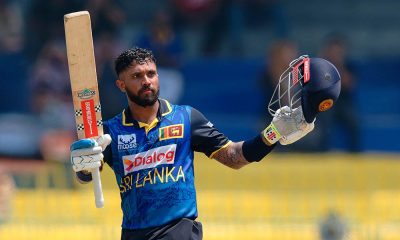
 Sports4 days ago
Sports4 days agoRemarkable turnaround for Sri Lanka’s ODI team
-

 Editorial7 days ago
Editorial7 days agoGroping in the dark
-
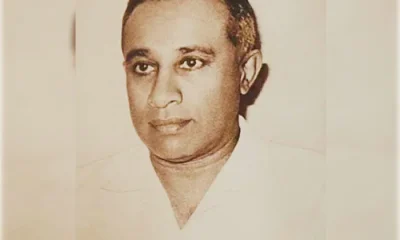
 Opinion7 days ago
Opinion7 days agoShortage of medicines: Senaka Bibile Policy is the solution
-

 Opinion7 days ago
Opinion7 days agoThe passing of Sarjana Karunakaran
-

 News5 days ago
News5 days agoSpeaker agrees to probe allegations of ‘unethical funding’ by USAID
-

 Features4 days ago
Features4 days agoScammed and Stranded: The Dark Side of Sri Lanka’s Migration Industry
-

 Business4 days ago
Business4 days agoUN Global Compact Network Sri Lanka: Empowering Businesses to Lead Sustainability in 2025 & Beyond




